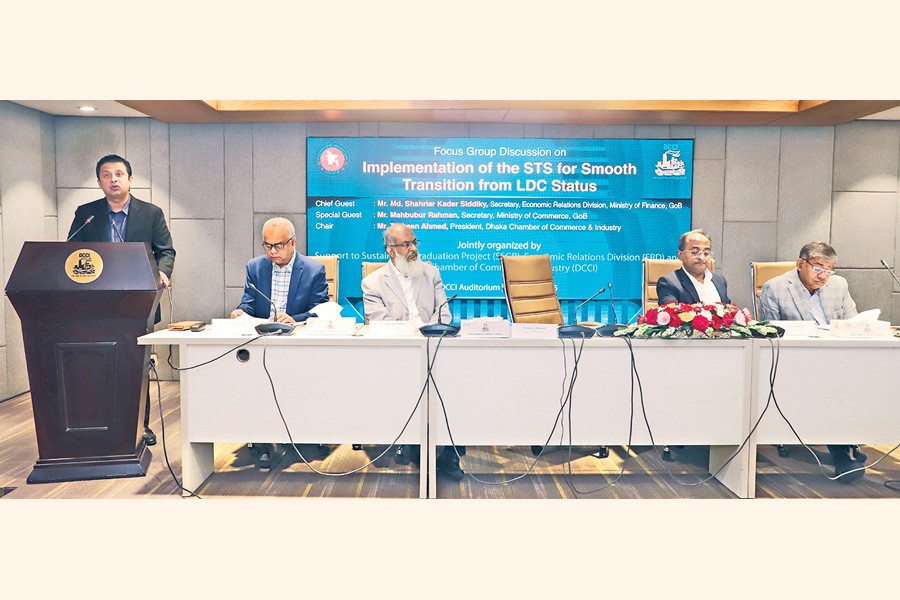
Published :
Updated :

President of Dhaka Chamber of Commerce and Industry (DCCI) Taskeen Ahmed have urged the government to defer Bangladesh's graduation from least developed country (LDC) status for at least 2 to 3 years considering the prevailing global and local economic challenges.
He said that an acute shortage of energy in the industrial sector, rising inflation and steep duty on import, high interest rates, procedural complexities in obtaining bank credit and limited access to credit for the private sector still pose a serious challenge to the country's economy.
He made the observations at a Focus Group Discussion on "Implementation of the STS for Smooth Transition from LDC Status" jointly organised by Support to Sustainable Graduation Project (SSGP), Economic Relations Division (ERD) and DCCI at DCCI auditorium in the capital on Monday.
Presenting a keynote paper from the private sector perspective, the DCCI president noted that the GDP growth in the first quarter of the current fiscal was only 1.8 per cent, while the manufacturing sector grew by just 1.43 per cent.
Despite these challenges, Bangladesh is set to graduate from LDC status in 2026. A 'Smooth Transition Strategy (STS)' has already been formulated by the government.
Mr Ahmed highlighted some key elements for the implementation of the STS which include implementation framework, strong leadership and commitment, partnership and solidarity, policy integration, financing the strategy and effective monitoring and evaluation.
For an effective and competitive STS, he recommended developing a roadmap to stabilise the economy, creating a real-time monitoring and evaluation platform, signing economic partnership agreement with key partners and aligning trade, industrial and investment policies.
He stressed the need for skill development in the SME sector and ensuring long-term access to low-cost credit, signing free trade agreements to expand exports to the Middle East and South Asian countries, infrastructure development to attract FDI, and revision of revenue and related policies.
He also called for formulating and implementing specific policies to boost exports in other sectors with export potential beyond the readymade garment sector, such as pharmaceutical, leather and leather product, agro-processing, semiconductor, light-engineering and information technology. For a comprehensive and implementable STS, the role of private sector is crucial, he said.
Speaking as the chief guest, ERD Secretary Md. Shahriar Kader Siddiky laid emphasis on capacity building at all levels to deal with the impact of the loss of trade benefits in the post-LDC era. He said that a committee will be formed with the representatives of trade organisations to determine the needs of the private sector and find solutions.
He said despite the ongoing economic challenges, there have been significant improvements in the current account and financial account. He further said that South Korea has agreed to help Bangladesh implement digitalization at all level of government services.
Speaking as the special guest, Commerce Secretary Mahbubur Rahman said that there was a lack of proper planning and implementation from the beginning to meet the challenges of LDC graduation, but more attention should be paid for a sustainable LDC graduation process based on the opinion of the private sector. He called upon the private sector to focus on product diversification in the RMG sector as well as explore opportunities in the promising packaging area.
In his welcome speech, A H M Jahangir, additional secretary and project director, Support to Sustainable Graduation Project (SSGP), Economic Relations Division, said that the private sector will face the most significant challenges during the LDC graduation. In such a situation, along with the private sector support, coordinated efforts among stakeholders concerned are essential for the implementation of the STS, he added.
Dr Mostafa Abid Khan, component manager (former member of Bangladesh Trade and Tariff Commission), SSGP, ERD, said that about 73 per cent of the total export enjoys duty-free benefits, which will no longer be available in the post-LDC period. Additionally, the country will lose several institutional benefits, he said.
Dr Md Rezaul Bashar Siddique, component manager, SSGP, ERD said that it is possible to achieve microeconomic stability through the implementation of STS.
Rizwan Rahman, former president of DCCI, said until the 'Medium' category is separated from the CMSME, the cottage and small entrepreneurs will never get the full benefits of government's policy support.
Chairman of Anwar Group of Industries Manwar Hossain said they are lagging behind in the infrastructure sector, and the shortage of gas supply in the steel and cement industries is hampering the production, which is affecting the entire economy.
BKMEA President Mohammad Hatem said since 2022, they are observing a downward trend in every indicator of the economy, along with mismatch in export data. He also highlighted that some past policies of the government and Bangladesh Bank were not conducive to export growth. Given the current situation, he stressed that the private sector needs more time to prepare for LDC graduation.
Asif Ashraf, former director of BGMEA, stated that they are not ready for LDC graduation at the moment and to get the GSP Plus benefit, the industry has to focus on backward integration.
Md. Mahbubur Rahman Patwary, managing director of Sonali Ash Industries Limited, said the government's technical and financial support is essential to diversify the jute sector.
DCCI Senior Vice-President Razeev H Chowdhury, Vice-President Md. Salem Sulaiman, and members of the Board of Directors and representatives of the public and private sectors attended the event.
talhabinhabib@yahoo.com


 For all latest news, follow The Financial Express Google News channel.
For all latest news, follow The Financial Express Google News channel.